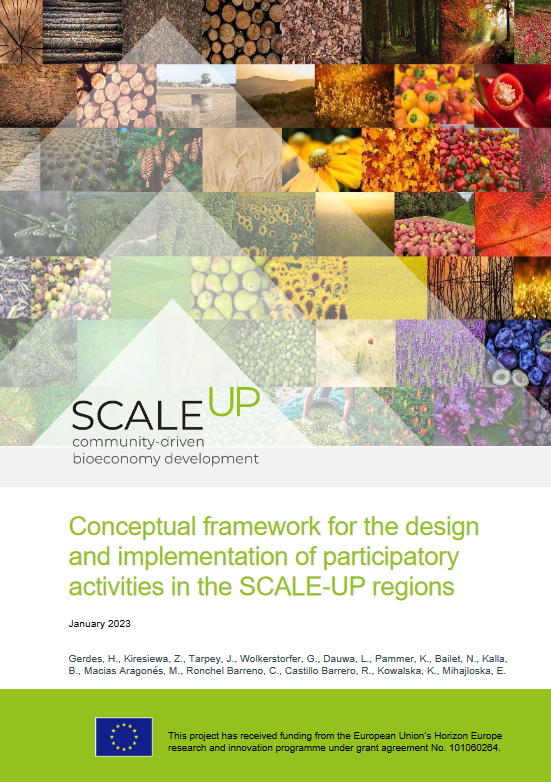Conceptual Framework for the Design and Implementation of Participatory Activities in the SCALE-UP Regions
- Publikation
- Zitiervorschlag
Gerdes, H. et al. (2023). Conceptual framework for the design and implementation of participatory activities in the SCALE-UP regions (EU Horizon GA no. 101060264), D1.2
This framework sets out a holistic approach to foster community-driven bioeconomy development across six rural European areas. Building on a four-phase methodology – establishing regional knowledge and platforms; cross-regional knowledge transfer; creation of a pan-European Community of Practice; and dissemination – the report aligns with the European Green Deal and the second pillar of the EU's Common Agricultural Policy (CAP). It identifies relevant biomass streams (from sawdust and agricultural residues to hemp and olive by-products) and outlines valorization options that drive local innovation while respecting ecological limits.
Guiding Principles and Regional Engagement
Central to SCALE-UP are five participatory principles – co-creation, openness, inclusiveness, transparency, and sustainability – that ensure bio-based solutions reflect the needs and values of local communities. Each region establishes a multi-actor platform (farmers, SMEs, policymakers, researchers, and civil society) tailored to its context – whether it’s forestry networks in Northern Sweden or agricultural clusters in Andalusia. These platforms mobilize existing networks, from Chambers of Agriculture in the French Atlantic Arc to Local Action Groups in North Macedonia, creating spaces for stakeholder workshops, capacity building, and innovation support.
Practical Steps for Community-Driven Activities
The report provides step-by-step guidance for designing and running participatory activities:
- Platform setup: Define stakeholder roles, meeting formats (online, hybrid, in-person), and governance structures to sustain engagement beyond the project lifetime.
- Activity design: Apply community-led local development criteria to identify, assess, and promote two bio-based solutions per region that deliver social, economic, and environmental benefits.
- Innovation support: Form Task Forces combining regional experts and entrepreneurs to conduct needs-assessment surveys and deliver tailored market and business-model guidance.
By embedding these practical guidelines within regional priorities – from nutrient recycling to rural value-chain strengthening – the framework equips rural communities to co-create resilient, circular bioeconomies.




